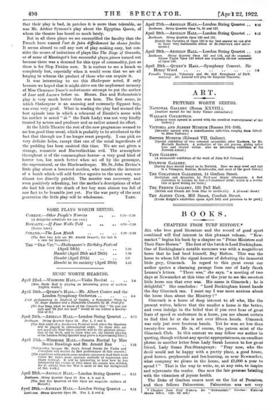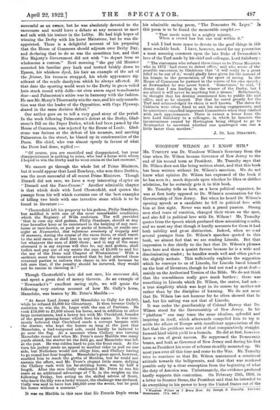BOOKS.
CHAPTERS FROM TURF HISTORY.* ALL who love good literature and the record of good sport combined will find interest in this pleasant volume. " New- market " begins his book by a chapter on " Prime Ministers and Their Race-Horses." The first of the hatch is Lord Rockingham. One of Rockingham's notable successes was with a magnificent horse that he had bred himself, Bay Halton. This was the horse to whom fell the signal honour of defeating the immortal little grey, Gimcrack. In regard to this great event our author quotes a charming passage from one of Lady Sarah Lennox's letters. " There was," she says, " a meeting of two days at Newmarket at this time of the year to see the sweetest little horse run that ever was. His name is Gimcrack ; he is delightful." She concludes : " Lord Rockingham kissed hands the day Gimcrack ran. I must say I was more anxious about the horse than about the Ministry ! "
Gimcrack is a horse of deep interest to all who, like the present writer, believe that the smaller a horse is the better, and even indulge in the belief that if you ever hear of great feats of speed or endurance in a horse, you are almost certain to find that he or she is not over fifteen hands. Gimcrack was only just over fourteen hands. Yet he won no less than twenty-five races. He is, of course, the patron saint of the Gimcrack Club. In this context we may follow our author in quoting, though without any special appropriateness, an excellent phrase in another letter from Lady Sarah Lennox to her great friend, Lady Susan Fox-Stra.ngways : " Pray now, who the devil would not be happy with a pretty place, a good house, good horses, greyhounds and fox-hunting, so near Newmarket, what company we please in the house, and £2,000 a year to spend ? " That is the way to write, or, at any rate, to inspire and rejuvenate the reader. One sees the fair penman bristling with the vitamines of joyous health.
The Duke of Grafton comes next on the list of Premiers, and then follows Palmerston. Palmerston was not very • Chapters from Turf History. BY " Newmarket:* yestassi: fratioeef Review Office. 110s. ad. mkt
successful as an owner, but he was absolutely devoted to the racecourse and would leave a debate at any moment to meet and talk with his trainer in the Lobby. He had high hopes of winning the Derby with his horse Mainstone, but he was dis- appointed. There is a delightful account of his proposing that the House of Commons should adjourn over Derby Day, and declaring that to do so was the unwritten law, and that Her Majesty's Government did not wish " to depart from so wholesome a custom." Next morning " the gay old Minister mounted his familiar grey hack and trotted briskly down to Epsom, his whiskers dyed, his hair an example of the art of the friseur, his trousers strapped, his whole appearance sig- nificant of the senile dandyism which he always affected. At that date the sporting world went to the Derby in green veiled hats stuck round with dolls—tot circa totem caper turns Ituanees deos—and Palmerston's attire was in harmony with the fashion. He saw Mr. Merry's Thormanby win the race, and his only consola- tion was that the leader of the Opposition, with Cape Flyaway, shared in the same decisive defeat."
Our author goes on to tell a very good story of the period. In the week following Palmerston's defeat at the Derby, Glad- stone's Bill on the Paper Duties, which had been passed by the House of Commons, was rejected by the House of Lords. Glad- stone was furious at the defeat of his measure, and meeting Palmerston in the street, he blazed up in condemnation of the Peers. His chief, who was almost openly in favour of what the Peers had done, replied:— "Of course, you are mortified and disappointed, but your disappointment is nothing to mine, who had a horse with whom I hoped to win the Derby and he went amiss at the last moment."
We cannot go through the whole list of Prime Ministers, but it would appear that Lord Rosebery, who won three Derbies, was the most successful of all recent Prime Ministers. Though Disraeli did not race, we have a very interesting chapter on " Disraeli and the Race-Course." Another admirable chapter is that which deals with Lord Chesterfield, and quotes the passage from his will which contains one of the best examples of killing two birds with one invective stone which is to be found in literature :-
"Chesterfield left his property to his godson, Philip Stanhope, but saddled it with one of the most remarkable conditions which the Registry of Wills enshrines. The will provided ' that in case my said godson, Philip Stanhope, should at any time hereafter keep or be concerned in the keeping of any race- horse or race-horses, or pack or packs of hounds, or reside one night. at Newmarket, that infamous seminary of iniquity and ill manners, during the course of the races there, or shall resort to the said races, or shall lose in any one day at any games or bet whatever the sum of £500 there ; and in any of the cases aforesaid it is my express will that he, my said godson, shall forfeit and pay out of my estate the sum of £5,000 to and for the use of the Dean and Chapter of Westminster.' With a sardonic sneer the testator avowed that he had selected these reverend parties to enforce this clause in his will because he felt sure that, if the penalty, should be incurred, they would not be remiss in claiming it ! '
Though Chesterfield's heir did not race, his successor did, and spent a great deal of money thereon. As an example of " Newmarket's " excellent racing style, we will quote the following very curious account of how Mr. Gully's horse, Mameluke, was beaten by Mr. Petre's Matilda :- " At Ascot Lord Jersey sold Mamoluke to Gully for £4,000, while he refused £5,000 for Glenartney. It then became Gully's ambition to win the St. Leger with the son of Partisan. He took £10,000 to £1,000 about his horse, and in addition to other large investments, had a heavy bet with Mr. Crockford, founder of the great gaming-house which bore his name. It was com- monly believed that Crockford made a corrupt bargain with the starter, who kept the horses so long at the post that Mamoluke, a bad-tempered colt, could hardly be induced to go near the flag. At a moment when Chifney was turning Mamoluke round and when Mr. Petre's mare Matilda was many yards ahead, the starter let the field go, and Mamoluke was loft at the post. He was ridden hard to join the front rank. At the turn his jockey made an appeal to another rider to pull on one side, but Nicholson would not oblige him, and Chifney having to go round lost four lengths. Mameluke's great speed, however, enabled him to reach the girths of Matilda but he could not sustain the effort, and Mr. Petre's elegant little mare, defying the Chifney rush with his far-striding horse, won by half a length. After 'the race Gully challenged Mr. Petra to run his mare at an additional advantage of 7 lb. in the weights on the following Friday, but acting on the skilled advice of Scott, who knew the filly was a lucky winner, the challenge was declined. Gully was said to have lost £45,000 over the event, but he paid his losses without a murmur."
It was on Matilda in this race that Sir Francis Doyle wrote his admirable racing poem, " The Doncaster St. Leger." Ts this poem is to be found the memorable couplet :—
" That needs must be a mighty minute,
When a crowd has but one soul within it."
I wish I had more space to devote to the good things in this most readable book. I have, however, saved for my peroration a most amusing comment upon the late Duke of Devonshire's love of the Turf made by his chief and colleague, Lord Salisbury :
" The statesman who refused three times to be Prime Minister, who in 1873 had come to detest office,' and who wrote of the possible succession to Gladstone that it will really be a great relief to bo out of it,' would gladly have given his life instead of his leisure to the prosecution of the sport of racing. In the House of Commons he yawned in the course of his own speech : at Newmarket he was never bored. Sometimes,' ho said, ' I dream that I am leading in the winner of the Derby, but I am afraid it will never be anything but a dream.' Reluctantly, he thought that his destiny summoned him to public life and office, and so he obeyed. But that he cared greatly for the Turf and acknowledged its claim is well known. The dates for Cabinets were often fixed to suit his racing engagements, and he sometimes cancelled important Committees when they clashed with such appointments. There is extant a letter from the late Lord Salisbury to a colleague, in which he laments the inconvenience caused by Hartington being obliged to go to Newmarket to ascertain whether one quadruped can run a little faster than another."
J. ST. Lou STRACHEY.



































 Previous page
Previous page